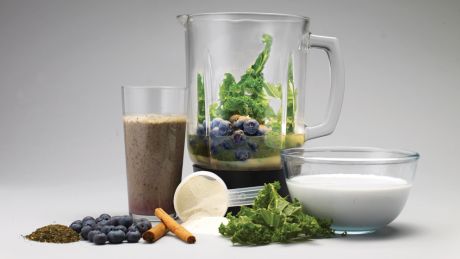Kale and Coconut Protein Smoothie Recipe
Pack in some protein with this tasty smoothie prescribed by nutritionist Gabriella Peacock

This high-protein smoothie makes a great post-workout snack, containing easily absorbed whey protein that will help with muscle recovery and growth. Kale and blueberries are loaded with vitamins and antioxidants, and both the whey protein and fats from the coconut milk will keep you feeling full for longer.
Like our other best smoothie recipes and protein shake recipes, this smoothie can be swapped out for a meal of similar calorific value if you’re following a weight loss meal plan for women or a weight loss diet plan for men.
Kale and Coconut Protein Smoothie Recipe
451 calories
Ingredients (Serves One)
- Handful of blueberries
- 2tbsp whey protein
- ½ cup coconut milk
- ½ cup chilled green tea
- Pinch of cinnamon
- Handful of kale
Nutrition
We fed the smoothie ingredients into Myfitnesspal, one of the best weight-loss apps for calorie counting, to get a rough nutritional breakdown for these recipes so you can hit your macro goals. According to the NHS guidelines one serving of any smoothie counts as no more than one of your five-a-day.
This smoothie comes in at around 451 calories calories per serving. It provides approximately 51g protein, 23g carbohydrates, 21g fat and 3g fibre.
Blueberries are high in fibre, which keeps you feeling full and makes you less tempted to snack.
Whey protein contains amino acids that help to balance your blood sugar levels. For vegan alternatives here’s our pick of the best vegan protein powder.
Coconut milk provides fats that help with weight maintenance by boosting your fullness levels.
Green tea is rich in catechins, a type of flavonoid that stimulates the body to burn more calories.
Cinnamon helps reduce the production of insulin – a hormone that turns excess sugar into fat.
Kale is an excellent source of magnesium, which plays an important role in protein synthesis.
More About Healthy Eating
- This zingy carrot, apple and kiwi smoothie is packed with vitamins and antioxidants
- Everyone agrees antioxidants are important, so here are 45 antioxidant-rich foods to eat
- Here’s why you should eat healthy seeds and kernels, and what foods to add them to
- Take the hassle out of eating healthily with the UK’s best healthy meal delivery services

Lucy Miller is an experienced journalist who has worked across a range of health and fitness titles. She was the fitness and nutrition editor at Men’s Fitness UK, and has also been fitness editor of both Health & Fitness UK and Women’s Fitness UK. Lucy qualified as a NASM-certified personal trainer and nutritionist in 2008.
